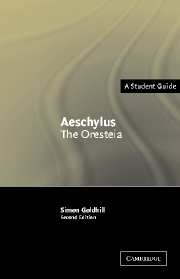3 - The influence of the Oresteia
Published online by Cambridge University Press: 05 June 2012
Summary
From Sophocles to the women's movement
A detailed portrait of some two thousand years of literary and dramatic influence of this Landmark is out of the question here. Rather than let this final chapter lapse into little more than a series of names or list of famous performances, I have chosen three key moments from the intellectual and literary after-life of this great work.
The first and most obvious area of influence is on the other great Athenian dramatists, Euripides and Sophocles. Both returned constantly to the Oresteia. There are innumerable echoes of language, dramatic technique and staging throughout their surviving works, but it is in particular in each playwright's Electra that the anxiety of influence is most strongly in evidence. Unfortunately, the relative dates of Euripides' and Sophocles' plays are unknown. But both take as their model the Oresteia, and in particular the Choephoroi. I shall look briefly therefore at each of these plays' rewriting of Aeschylus' rewriting of Homer.
The corpus of Sophocles' work is dominated by the pathology of extremism. In each play, he represents figures who are fiercely committed to personal honour, personal success, who come into increasingly bitter and unrelenting conflict with society, and who usually end at violent odds with the collective. This so-called Sophoclean hero (Knox; Winnington-Ingram; Segal) enacts the paradox that to achieve greatness is to go beyond the bounds of acceptability: transgression and outstandingness both involve going too far.
- Type
- Chapter
- Information
- Aeschylus: The Oresteia , pp. 85 - 91Publisher: Cambridge University PressPrint publication year: 2004



